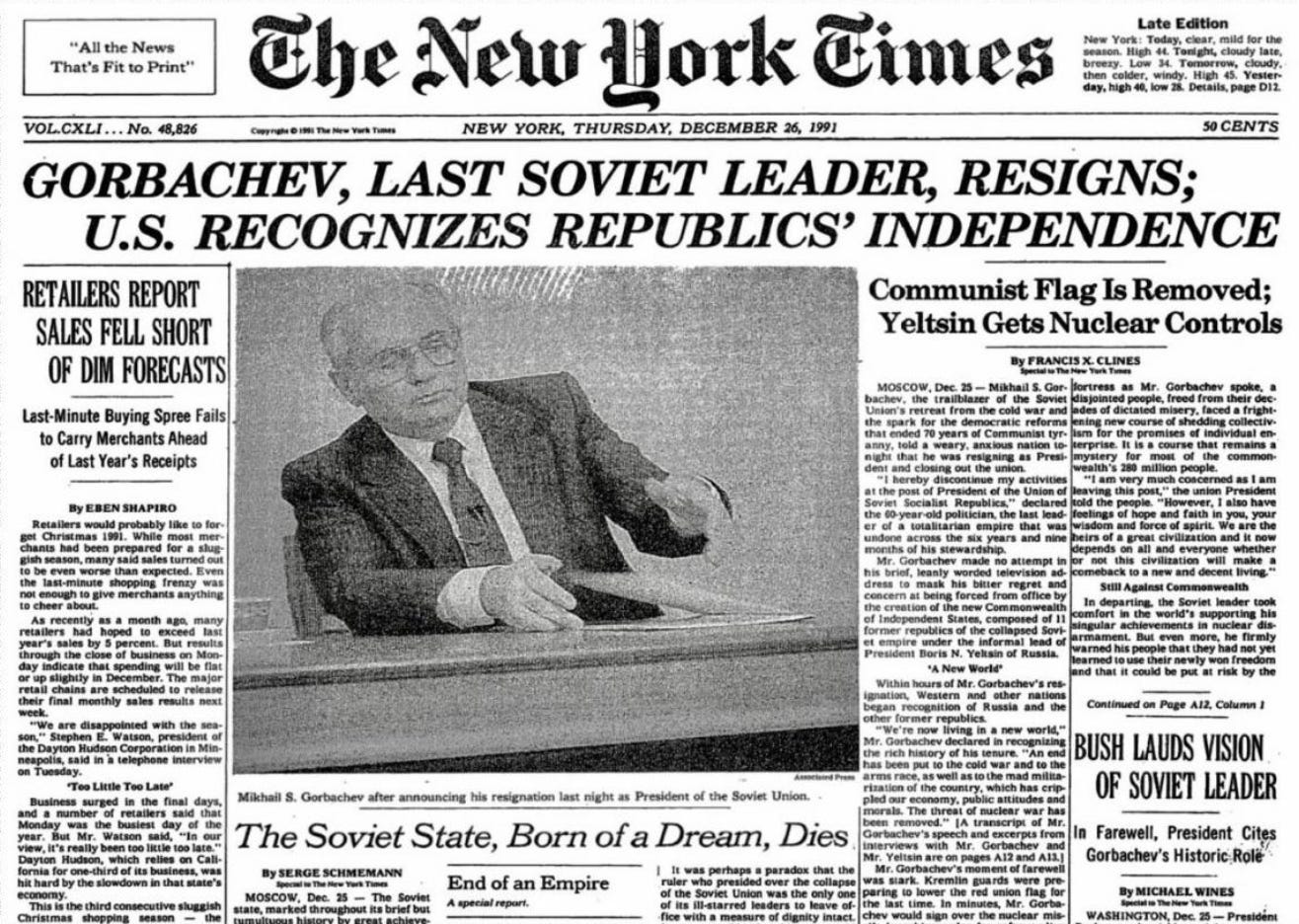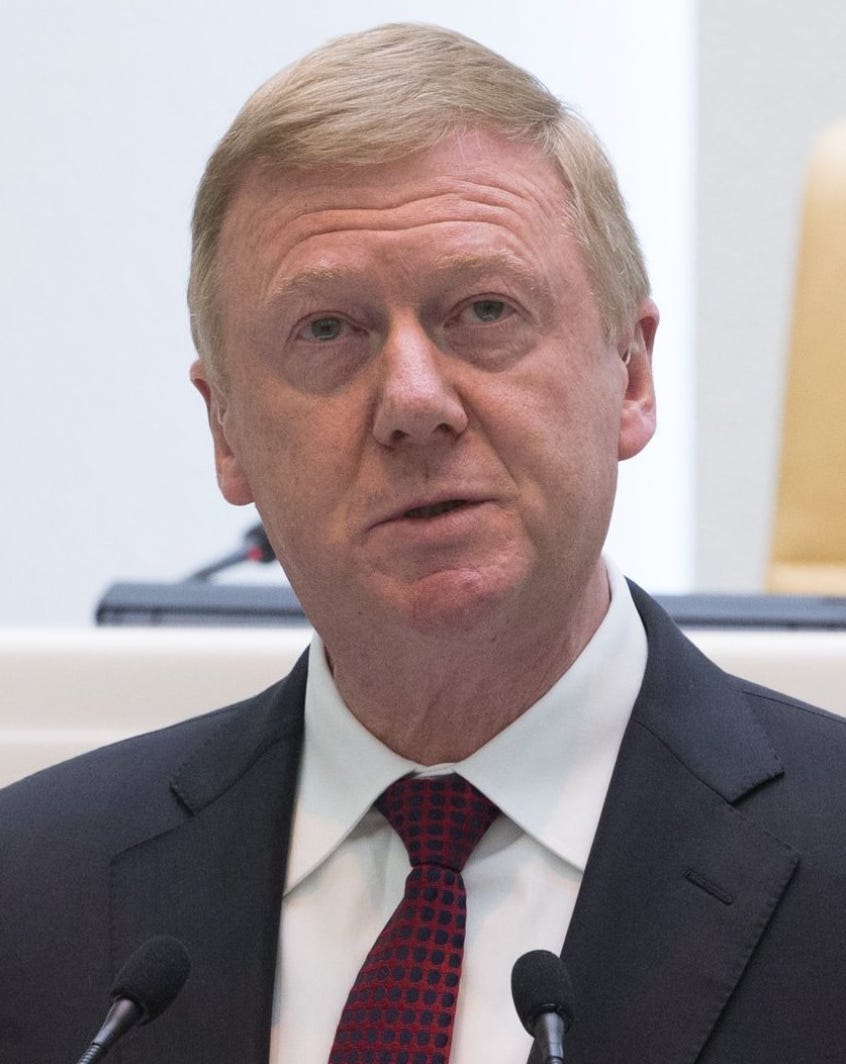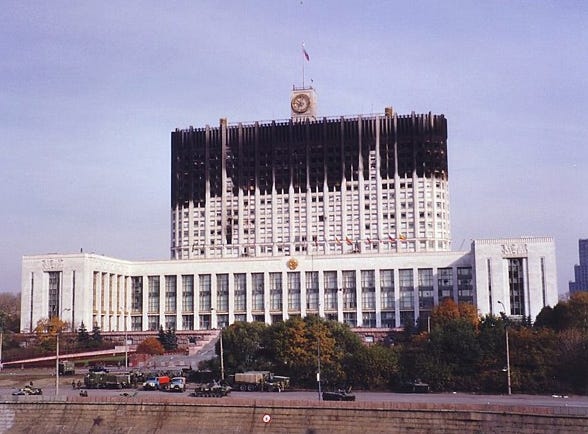The New York Times December 26, 1991, front page. Source: National Security Archive, “The End of the Soviet Union 1991”
While I work on a new original posting that I believe readers will find fascinating, I’m sending out this important article I’ve adapted from my archives. Originally published in January 2009 at my old Blogspot blog, Invictus, and updated in 2021, the article concerns the holocaust that ensued from the overthrow of the Soviet state and its replacement by capitalist restorationists. Its reposting is important, I believe, as it concerns the truth behind the overthrow of the Soviet Union, and the terrible human cost that the West’s “liberal democratic” campaign against communism entailed. This is not emphasized in Western media, or even most alternative media, for reasons that seem to me obvious.
The defeat of the Soviet workers state was engineered from within the Soviet Communist Party bureaucracy itself, in league with or with covert support of U.S. intelligence services, the Pentagon and the State Department, all of which had conducted a concerted campaign aimed at undermining the Soviet state since the late 1940s. There is much that one can criticize about the leadership of the old Soviet Union, but this article was not written as an analysis of the dissolution of the USSR. It is about the cost of disassembling the socialist superstructure of the society and replacing it with capitalist market forces.
It is interesting to consider that one of the chief architects of capitalist restoration within the Soviet Union, Anatoly Chubais, was until 2022 one of Vladimir Putin’s advisors and government-appointed officials. Chubais fled to Israel after opposing Russia’s invasion of Ukraine, itself a response to the ever-Westward press of U.S./NATO militarism.
A now-classic 1998 article by Janine R. Wedel at The Nation, “The Harvard Boys Do Russia,” described Chubais’s influence:
The architect of privatization was former First Deputy Prime Minister Anatoly Chubais, a darling of the U.S. and Western financial establishments. Chubais’s drastic and corrupt stewardship made him extremely unpopular. According to The New York Times, he “may be the most despised man in Russia.
“Essential to the implementation of Chubais’s policies was the enthusiastic support of the Clinton Administration and its key representative for economic assistance in Moscow, the Harvard Institute for International Development [HIID],” Wedel added.
Chubais, committed to “radical reform,” vowed to construct a market economy and sweep away the vestiges of Communism. The U.S. Agency for International Development (U.S.A.I.D.), without experience in the former Soviet Union, was readily persuaded to hand over the responsibility for reshaping the Russian economy to H.I.I.D….
The full article is very much worth reading, as it goes into great detail. It also describes the contributions of other important figures in this debacle, including Harvard professor Jeffrey Sachs; “Yegor Gaidar, [Boris] Yeltsin’s first architect of economic reform”; Clinton’s Under Secretary of the Treasury for International Affairs, Lawrence Summers (who was yet another Harvard professor); and “billionaire speculator George Soros,” among others.
“Anatoly Borisovich Chubais (born 1955) is a Russian politician” [translated from Russian] — Source: Council.gov.ru, 1917, CC BY 4.0, via Wikipedia
Wedel’s article began: “After seven years of economic ‘reform’ financed by billions of dollars in U.S. and other Western aid, subsidized loans and rescheduled debt, the majority of Russian people find themselves worse off economically. The privatization drive that was supposed to reap the fruits of the free market instead helped to create a system of tycoon capitalism run for the benefit of a corrupt political oligarchy that has appropriated hundreds of millions of dollars of Western aid and plundered Russia’s wealth.”
The wealth was plundered. Socialism was destroyed. And the cost? Beyond anything experienced in any Western society this side of World War Two.
For this repost I have quietly fixed some broken links and corrected some small errors or typos. One broken link could not be fixed and necessitated a bit of discussion in this latest version of the article. A few other small edits have been made for readability’s sake, including the addition of subheads. I have added some commentary, including an interesting quote by Masha Gessen. I also tweaked the article’s conclusion, without hopefully doing too much damage to what I wrote in the original. The link to the 2009 article is at the beginning of this introduction.
“The White House, the then-Russian Supreme Council building in Moscow, the capital of Russia, is seen just after it was set ablaze by tank shelling during the Moscow Riots.” — The “riots” were a civil conflict between those who opposed the dissolution of Soviet Communism and the new capitalist state run by Boris Yeltsin, backed by the United States and internal counter-revolutionary forces. The picture was taken on October 4, 1993, by “Bergmann at Japanese Wikipedia - Own work (original source on jawp: ja:File:ベールイドーム.jpg)” — Linked at Wikipedia.— CC BY 3.0
With Israel’s genocide in Gaza and murderous assault on Lebanon, perhaps the world has become so inured to mass death that the following story will merit little comment or outrage, even if the story did make the back pages of the New York Times some years ago. An important January 2009 Lancet study, "Mass privatisation and the post-communist mortality crisis," confirmed what has been known but little discussed in recent years: millions of people, mostly men of employment age, died as a result of the effects of the "shock therapy" transition from a collectivized to a privatized economy in Russia and other formerly "communist" states in East Europe.
According to the *Times *article, by 2007 "the life expectancy of Russian men was less than 60 years, compared with 67 years in 1985." Back in 2001, a UNICEF study had already claimed 3.2 million unnecessary deaths due to capitalist restoration. The Lancet study, authored by David Stuckler, MPH, Lawrence King, PhD, and Martin McKee, MD, cited other figures, with up to "10 million missing men because of system change." As a result, adult mortality rates soared, up almost 13% in Russia, with much of the increase attributable to the mass unemployment that followed the collapse in state enterprises.
The study noted, "the Russian population lost nearly 5 years of life expectancy between 1991 and 1994." Other factors affecting the disastrous increase in the death rate included poor health care, rising HIV rates, higher alcoholism and drug addiction rates, as well as the effects of acute psychosocial stress, massive corruption, impoverishment, rising social inequalities, and social disorganization.
This was a disaster with an epic scope, yet it hardly ever factors into discussions of Russia in the mainstream press or academia. This kind of silence feels like something more than uncaring. It feels like a deliberate “forgetting.” Moreover, the guilt of the U.S. and its allies in helping bring about this tragedy is great, and sooner or later, there will be some kind of reckoning for it.
“People kept dying”
A 2014 New York Review of Books article by Masha Gessen captured the awful reality of post-Soviet Russia to a visitor who knew Russia from its communist past.
Sometime in 1993, after several trips to Russia, I noticed something bizarre and disturbing: people kept dying. I was used to losing friends to AIDS in the United States, but this was different. People in Russia were dying suddenly and violently, and their own friends and colleagues did not find these deaths shocking. Upon arriving in Moscow I called a friend with whom I had become close over the course of a year. “Vadim is no more,” said his father, who picked up the phone. “He drowned.” I showed up for a meeting with a newspaper reporter to have the receptionist say, “But he is dead, don’t you know?” I didn’t….
The deaths kept piling up. People—men and women—were falling, or perhaps jumping, off trains and out of windows; asphyxiating in country houses with faulty wood stoves or in apartments with jammed front-door locks; getting hit by cars that sped through quiet courtyards or plowed down groups of people on a sidewalk; drowning as a result of diving drunk into a lake or ignoring sea-storm warnings or for no apparent reason; poisoning themselves with too much alcohol, counterfeit alcohol, alcohol substitutes, or drugs; and, finally, dropping dead at absurdly early ages from heart attacks and strokes.
The effects of neo-liberal "shock therapy" on Russia and other East European countries (Russia being the hardest hit) were also felt by the children of the region. According to the UNICEF study noted above, tuberculosis rates rose by 50%; 150,000 children were added to the public care rolls (while overall population was dropping by millions); there were high levels of child malnutrition, and the number of children under age 5 fell by one-third. This was not just a jolt of "shock therapy," it was a social tsunami that devastated the region.
“Shock Therapy”
According to The Lancet, the more rapid the rate of privatization, the higher the death rate.
Radical free-market advisers argued that capitalist transition needed to occur as rapidly as possible. The prescribed policy was called shock therapy, with three major elements: liberalisation of prices and trade to allow markets to re-allocate resources, stabilisation programmes to suppress inflation, and mass privatisation of state-owned enterprises to create appropriate incentives. When implemented simultaneously, these elements would cause an irreversible shift to a market-based economy.... Although a direct cause and effect relation cannot be ascertained and a detailed discussion of their roles is beyond the scope of this Article, all these findings can be linked, in some way, to mass privatisation programmes.
Of some interest is economist Jeffrey Sachs' own critique of the privatization programs and the changes he helped bring about with the dissolution of the Soviet Union. As early as 1994, Sachs wrote defensively, “Contrary to recent commentary, ‘shock therapy’ did not fail in Russia. It was never tried.” From Sachs’ point of view, the necessary Western financial aid never arrived, which could have made the “shock therapy” some kind of success. Sachs seems to have not understood that it was the policy of the United States to truly strangle the former Soviet Union, in an effort to snuff out any embers of revolution or socialism that might remain. The goal was untrammeled exploitation of the vast riches of the Russian state. Sachs was the capitalist version of the “useful idiot.”
As the U.S. economy teeters on the edge of free-fall [as it seemed to me in 2009, when I was originally writing this], due to the unbridled policies of financial deregulation, and an evisceration of the tax base through so-called "trickle-down" economics with its massive tax cuts to the very rich, we should all ponder, with awe and great sadness, the final denouement of the Cold War, with its frenzy of capitalist restorationist policies in the old Soviet Union, and the tremendous human cost it involved.
It is also important in understanding where Russia is politically today, i.e., what were the social circumstances that produced the Putin regime. Ever since the contrived Georgia-South Ossetia conflict in 2008, it has appeared that the military-industrial complex of the U.S. is looking to find new "enemies," should the public taste for the "Global War on Terror" lessen, and fatigue increase over the crimes and disasters of the wars in Iraq and Afghanistan. [As we can see, subsequent to 2009, the U.S. developed its anti-Russia efforts into a full-scale proxy war over Ukraine.]
Perhaps most of all, the sheer horror of the loss of life, the human tragedy of the return of "democracy" (in its free enterprise garb) to the former Soviet Union, is what we need to ponder. The truth behind the privatization policies of economists like Harvard-educated Jeffrey Sachs — who according to his own website is now “the Director of the Center for Sustainable Development at Columbia University, where he holds the rank of University Professor, the university’s highest academic rank” — has been hidden for years now behind glibly optimistic statements of economic progress in now-capitalist Russia.
Take for example this summary of a 1997 article in the Journal of Comparative Economics on "Bank privatization in post-communist Russia," [broken link] which is typical of the way the changes in Russia have been reported by the dominant social and educational Western elite:
The privatization of Zhilsotsbank of Russia demonstrates that the process of privatization can contribute to the eradication of the government's role in the corporate governance of banks. Incumbent bank managers obtained control rights over new private banks following Zhilsotsbank's decentralized privatization. The swift eradication of government from direct ownership of numerous banks, combined with broad licensing rules, has enabled the Russian banking industry to be over 75% private. Mosbusinessbank, a big commercial bank formed from 26 Zhilsotsbank branches, is one of the most profitable banks the old state banking system has produced.
Screenshot of a bank card for Mosbusinessbank. Source: Colnect.com
At least, that’s what the summary said back in 2009. Today, the link is broken (I’ve left it in for documentary purposes; sadly, there was no backup at Internet Archive.) But the abstract of the article is available online today and makes much the same point, with perhaps an embarrassed tip of the hat to something untoward (“instability”) in the post-communist Russian banking sector.
The rapid removal of government from direct ownership of many banks, in combination with liberal licensing policies, has created a Russian banking sector that is more than 75% private. The banking environment that has evolved has fostered innovation and increased efficiency, along with significant instability in the system.
In the original summary, there is not a word on the social cost of this increased profitability. It’s not clear what the published abstract means by “significant instability in the system.” The article is under paywall, and I don’t feel like paying to see what the authors mean by such instability. The point is, they are fans of private enterprise, and praise the "innovation and increased efficiency” that comes with capitalist control of the banking sector. I still detect no understanding of the massive social and human cost to all this.
World Historical Truths
In fact, the social disaster in Russia due to privatization and the restoration of capitalism in Russia is barely known or understood in the U.S., outside a sense that gangsterism was increased thereby. Indeed, Russian mafia types play an outsized role in the spy dramas of modern U.S. television.
The truth about world history since the end of World War II has largely been kept from the U.S. population, e.g. the recruitment of Nazi war criminals into U.S. government research programs, including the intelligence agencies; the mass murders in the 100,000s by U.S. allies in Korea (with U.S. connivance); the secret budget of U.S. intelligence agencies and the extent of the latter's covert actions around the globe; and the CIA's mind control project with its enlistment of top levels of social, medical and psychological personnel throughout the 1950s-1970s, and the secret medical experiments upon these programs involved.
My own work has in recent years concentrated on exposing the U.S. covert use of biological weapons during the Korean War, and the cover-up of that crime.
The level of trust in what the U.S. government says is very low right now, thanks to the crimes of recent administrations. The Biden administration was the inheritor of the policies of the Obama administration. The latter sent mixed messages about what it how it wished to handle the checkered past record of the United States.
On one hand, the Obama people promised an open government and transparency, even as they censored pictures of U.S. torture and refused to release the full Senate report on the CIA’s rendition and torture program. Openness is still the unreliable mantra of the Biden administration, and I assume would be the same for a Harris administration. Today, “openness” and “transparency” are considered by many to be code-words for government hypocrisy and lies.
For all his bluster about the “deep state,” Donald Trump did very little to enhance governmental transparency. For his part, Obama determined that his administration would “look forward” and not backwards when it came to former administration crimes.
As we consider the pressing need to hold the U.S. to account, no matter what administration is in power, we might reflect upon the famous words of Nobel Prize-winning author William Faulkner: "The past is never dead. It's not even past." Shakespeare made essentially the same point hundreds of years earlier: "What’s past is prologue."





I think they are kind of bemused by US politics, whereas Turkey and Saudi Arabia and Israel have a much more direct involvement as they wish to get a better deal out of their masters.
Putin talks about how he prefers Harris now, the Chinese joke online that Trump's trade war would help them. It's counterintuitive, but none of it fits the election interference claims of Dems or GOP.
If anyone were serious about fixing the rigging of our elections they wouldn't be talking about malign influence on public opinion at all. It has zero effect on policy statistically.